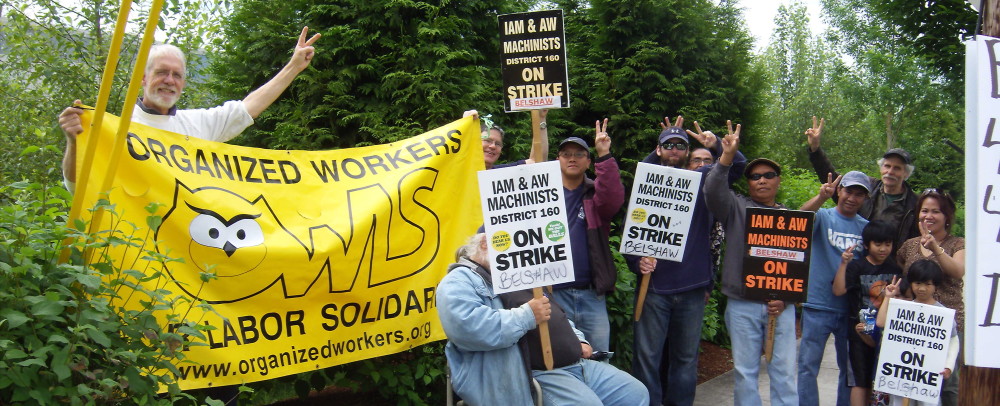Amidst massive Black Lives Matter demonstrations against police violence, the Martin Luther King, Jr. County Labor Council (MLK Labor) voted to expel the Seattle Police Officers Guild on June 17. MLK Labor, which represents over 100,000 union members in the greater Seattle area, became the first AFL-CIO body to take such a stand.
It was a momentous victory for an alliance of rank-and-file labor activists and progressive union locals, which came together over a two-week period to win the majority vote. Organized Workers for Labor Solidarity (OWLS) played a key role in coalescing these forces.
How it all started. OWLS is a multiracial organization of labor activists which promotes cross-union solidarity in order to revitalize labor militancy and organize the unorganized. Based on their principles and real-life experiences, OWLS members believe it was a mistake to allow the Seattle’s Police Officers Guild to join MLK Labor in 2014. In addition to being an agency riddled with racism, the police have historically been used to smash labor strikes.
The Guild’s membership led to MLK Labor supporting a 2018 union contract that has been used to avoid compliance with a federal consent decree, which imposed oversight of the police department in 2012. The court-ordered decree mandated changes to address rampant racial profiling and unnecessary use of force by the Seattle Police Department, and it has been extended several times due to non-compliance. The Guild contract blocks any accountability and maintains the status quo where police are above the law – with deadly results for people of color. And the brutality continues as over 14,000 complaints of abuse have been filed in Seattle during the recent peaceful Black Lives Matter protests.
In a letter urging MLK Labor to expel the Guild, OWLS pointed to the history of the institution of policing born in the slave patrols that hunted down African Americans and returned them to slavery. Throughout U.S. history, the police have violently enforced institutionalized racism, from upholding Jim Crow laws against Blacks to carrying out “stop-and-frisk” laws that target all people of color.
The role of police. In addition to engaging in racist violence, police routinely protect white supremacist organizations. Over the last three years, police have routinely blockaded and pepper-sprayed members of OWLS and other unionists and community members at counter-protests against the confederate flag-waving, gun-toting ultra-right, neo-Nazi and anti-labor groups.
The presence of police unions inside labor councils alienates the very workers labor is trying to organize – young people, Blacks, women and immigrants. It puts those in charge of enforcing anti-worker laws, such as picketing injunctions, directly inside the House of Labor. When OWLS traveled to Eastern Washington this spring to join Yakima Valley fruit-processing workers who were striking over the lack of personal protective equipment and the right to unionize, the workers described police carrying out union-busting efforts of their bosses. Labor history is plagued with examples of Pinkertons now turned police. At the June 17 labor council expulsion, many unionists agreed.
Expulsion vote. OWLS held a strategy session and contacted like-minded unionists leading up to the July 17 labor council Zoom meeting where the vote was held. The debate and voting lasted into the night, and several OWLS members where among the council delegates who argued strongly for expulsion. The same evening, hundreds rallied in person inside the Capitol Hill Occupied Protest (CHOP) zone to show their support for a cop-free labor movement. Gil Veyna, a veteran Chicano labor activist and OWLS member, gave an impassioned address to the rally, including his personal experiences with police brutality.
The vote to expel the Guild from MLK Labor was a first step in building a labor movement that can lead in the fight for both racial and economic justice. Many of our unions are still divided on this question, so now is the time to educate and organize. The more rightward leaning unions, often in the building trades, fail to see that labor cannot grow during the economic crisis that looms before us unless it addresses the broader social issues that have galvanized a younger generation.
Promising revival. A debate is raging inside labor today: do we continue to fund the campaigns of fair-weather friends in the Democratic Party while strike funds whither? Seattle is a case in point – it is run by Democrats who shield giants like Amazon from taxation, while COVID19 spreads in their warehouses. And despite the progressive optics of a white lesbian mayor and a Black woman chief of police, this city comes down with an iron fist on protesters, while also slashing budgets and furloughing frontline city workers.
Today, as tens of thousands of people pour into the streets to protest police brutality and racist injustice, there is no ground for neutrality or conservatism by labor on these fundamental questions.
Let’s toast the victory of getting the police guild out of MLK Labor and roll up our sleeves to rebuild a labor movement — one that aggressively fights against police abuse and austerity measures and for taxing the billionaires to fund social services, healthcare, education, and a mass public jobs program for the unemployed.
Organized Workers for Labor Solidarity
OWLS is an open, multiracial, multicultural group of rank-and-file labor activists, committed to education and action with the aim of building solidarity and fighting spirit in the labor movement.
